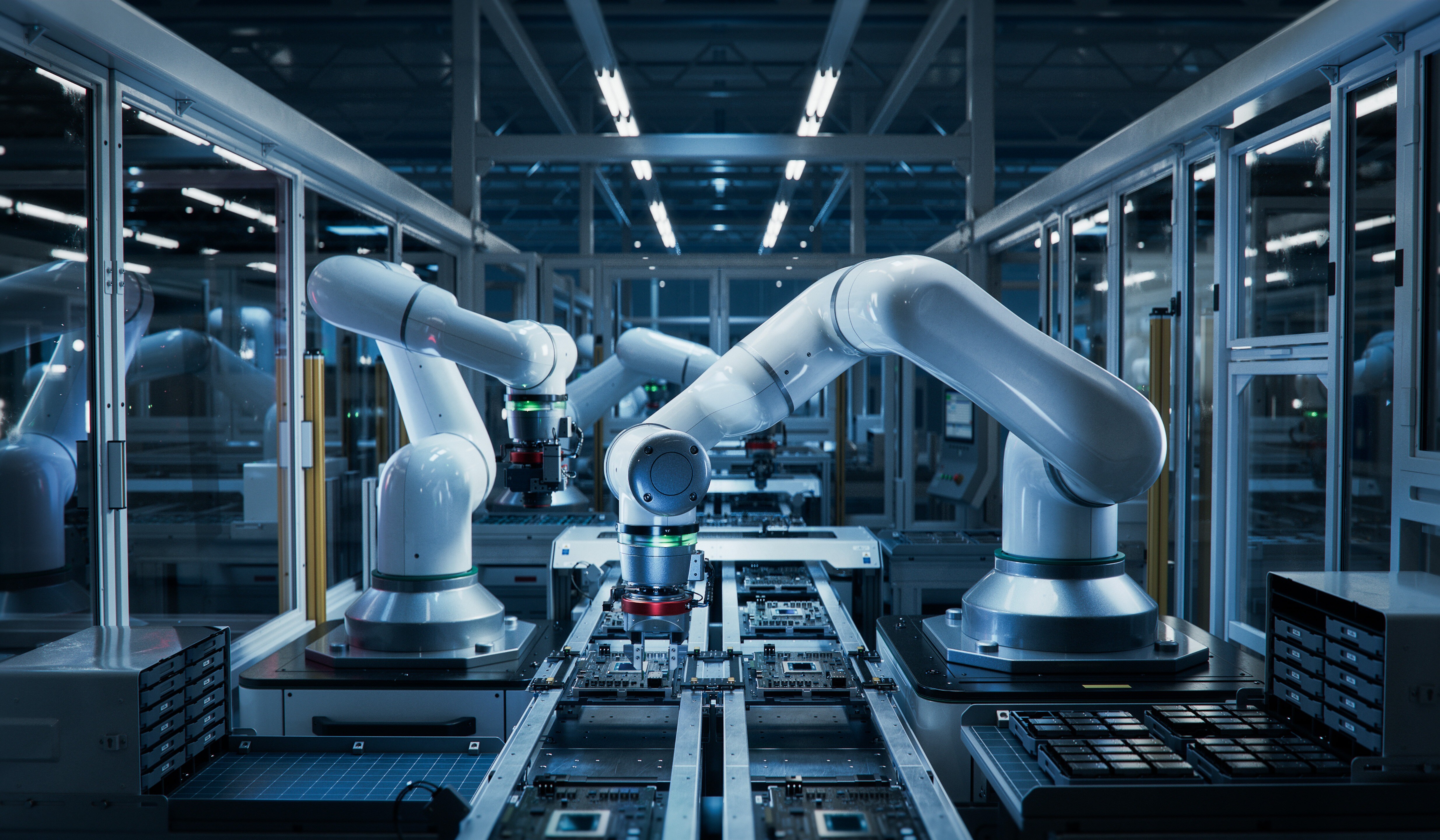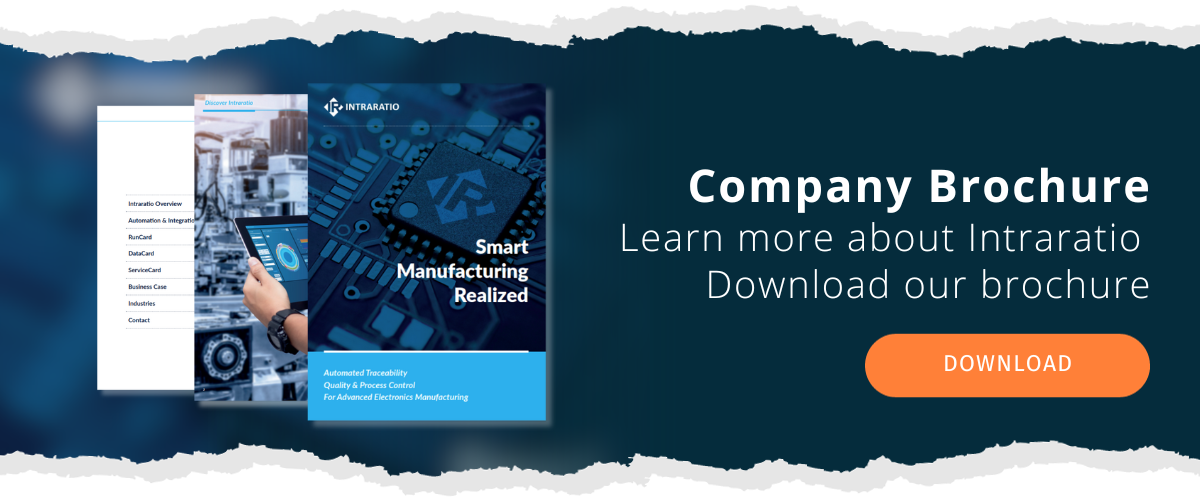AiCard: The Future of Manufacturing Analytics
In today's ever-changing manufacturing ecosystem, being highly efficient, providing exemplary...
By: Ryan Gamble on Jul 02, 2024

Today's electronics manufacturing operations are rapidly growing in complexity, and there is a constant need to enhance workforce skills while addressing rising product integration, quality, reliability, and time-to-market requirements.
Incorporating a data-centric approach with cutting-edge technologies to address these challenges is no longer optional. It is an absolute necessity for survival in this industry.
The growth in AI software capabilities is transforming how we harvest and derive value from manufacturing data. Starting with suppliers to engineering through operations, machine learning algorithms are revolutionizing manufacturing, driving unprecedented efficiency, accuracy, and insights. This ushers in a new era of excellence.
This is not only exclusive to organizations that can afford to spend millions; it is readily accessible for any organization at a low cost with a vision and a drive to succeed.
Intraratio, with our latest product, AiCard, is at the forefront of this accessibility and enablement. We offering an established and comprehensive solution for harnessing the power of machine learning in order to deliver rapid advancement and ROI to manufacturing operations.

The manufacturing industry has always been data-intensive, with vast amounts of information generated at every stage of the production process. However, traditional data collection and analysis methods are now cumbersome, time-consuming, and more prone to human error as product development and fabrication increase in complexity.
This is where AI software comes into play, specifically in machine learning applications to automate data processing and analysis. By automating data processing and analysis, machine learning algorithms provide manufacturers with real-time insights and actionable intelligence, enabling them to make informed decisions quickly and accurately.
A key critical significant advantages of machine learning in manufacturing is its ability to detect and report outliers. Outliers, or anomalies in data, indicate potential issues in the production process, such as defects in materials, equipment malfunctions, or deviations from standard operating procedures. Identifying these outliers is crucial for maintaining product quality and optimizing manufacturing performance. AI-powered tools like AiCard excel in this area, offering automated outlier detection and reporting and bringing new visibility to product data at every stage of the manufacturing process.
AI in manufacturing refers to the use of machine learning (ML) solutions and deep learning neural networks to optimize manufacturing processes with improved data analysis and decision-making. Industrial IoT and smart factories generate large amounts of data daily, making AI an essential tool for harnessing this data to drive efficiency and innovation.
A commonly cited AI use case in manufacturing is predictive maintenance. By applying AI to manufacturing data, organizations can better predict and prevent machine failure, reducing expensive downtime in return. AI also has many other potential uses and benefits, such as improved demand forecasting and reduced waste of raw materials. AI and manufacturing have a natural relationship since industrial manufacturing settings already require people and machines to work closely together.
According to a study by PwC, reinforcement learning (a subset of AI) is capable of optimizing electronic device production by dynamically adjusting machine parameters in smart manufacturing. Through continuous learning and adaptation, the system maximizes output, minimizes defects, and enhances resource utilization, leading to heightened profitability and a competitive edge.
Overall, AI changes the manufacturing environment by fostering innovation, cutting expenses, and improving overall operational performance. To better understand the importance of AI for the manufacturing industry, let’s study its popular use cases with real-life examples.
The manufacturing industry constantly seeks ways to improve efficiency and quality to reduce costs and get to market faster. The technology that delivers these improvements is artificial intelligence (AI). Here are the AI use cases transforming manufacturing today:
Machine learning algorithms sift through mountains of data produced on a factory floor as a first-order detection of outliers that indicate potential quality or operational issues. These outliers are indicative of defects not caught by traditional actions such as applying limits on electrical or functional test data. Identifying defect signatures early in manufacturing processes enables timely corrective actions, resulting in significant time, materials, and labor cost savings.
Predictive maintenance uses machine-generated data, such as settings and log data, including conveyor or stage offset values, stepper motor speeds, thermal, vibration, voltage, and current sensor monitor data. By training machine learning algorithms with this data, these algorithms can analyze this data in real-time to detect anomalies and alert maintenance teams to potential problems before they occur. Thus providing a prediction of when equipment is likely to fail. Beyond savings by avoiding downtime, they reduce the cost of maintenance by only servicing equipment when necessary.
Order planning optimization tools use machine learning algorithms to optimize the prioritization and scheduling of work on the factory floor. This application of machine learning helps manufacturing companies reduce lead times by reducing machine changeover delays and optimizing inventory staging and consumption. This leads to increased customer satisfaction and retention by ensuring the timely delivery of high-quality products.
In summary, adopting and implementing our AiCard is revolutionizing the manufacturing industry by enhancing efficiency, quality, and productivity. By leveraging AI technologies, manufacturers can automate data-intensive tasks to reduce errors, optimize processes, and make data-driven decisions, ultimately leading to improved performance and customer satisfaction and, most importantly, remaining relevant and competitive in this new age of manufacturing automation.
AiCard, developed by Intraratio, represents the pinnacle of AI-driven manufacturing analytics. This innovative tool provides a comprehensive view of outlier data, delivering instant notifications of in-process critical outliers and streamlining critical decision-making processes. By automating data evaluation tasks, AiCard frees up valuable engineering and operations time, allowing professionals to focus on data analysis and improvement rather than data collection.
One of the standout features of AiCard is its seamless integration with Intraratio's RunCard and DataCard solutions. This integration allows users to analyze and report data anomalies without the hassle of managing extra data pipelines or obsolete processes. The result is a more efficient and effective data management system that supports continuous improvement and operational excellence.
Advanced Automation: AiCard's cutting-edge automation capabilities quickly identify and alert users to anomalies in real-time. This proactive approach ensures that potential issues are addressed promptly, minimizing downtime and reducing the risk of defects.
Automate Complex Processes: AiCard's ability to provide automated outlier detection and reporting enhances visibility into product data throughout the manufacturing process. This capability is crucial for maintaining high standards of quality and consistency.
Industry-Wide Applications: AiCard's versatility makes it suitable for a wide range of manufacturing industries. Whether in automotive, aerospace, electronics, or consumer goods, accurate data collection and analysis are essential for high-quality production processes. AiCard meets these needs with its robust and flexible features.
Integration with Intraratio Products: AiCard is designed to work seamlessly with other Intraratio products, including RunCard (MES) and DataCard (YMS) databases. This integration creates a cohesive ecosystem that supports comprehensive manufacturing solutions.
Consider a scenario in an automotive manufacturing plant where maintaining high standards of quality and efficiency is paramount. In such an environment, even minor defects or deviations can lead to significant consequences, including costly recalls or production delays. And as unit volumes increase, the ability of people to manually analyze the growing data sets becomes completely impractical. For example: on a factory line building 10,000+ automotive bluetooth/ethernet controller modules a day, how would management know that a single operator intervened on a pick-n-place machine, on one board, to get the line moving due to an event? AiCard's advanced automation and outlier detection capabilities provide the plant with real-time insights into every aspect of the production process, from raw material inspection to final assembly, to these types of quality events. By identifying anomalies early, the plant can address issues promptly, ensuring that only high-quality products reach the market.
In the aerospace industry, where precision and reliability are critical, AiCard's ability to automate complex data evaluation tasks is invaluable. The tool can analyze vast amounts of data generated during the production of components and sub-assemblies, including supplier-delivered components and sub-assemblies, accompanied by data reports, identifying outliers that may indicate potential defects or deviations from specifications. This proactive approach helps aerospace manufacturers maintain the highest quality and safety standards, reducing the risk of failures and enhancing overall operational efficiency.
Similarly, in the silicon photonics and semiconductor manufacturing sector, where rapid innovation and high demand require efficient and accurate production processes, AiCard's seamless integration with existing data schemas ensures that manufacturers can analyze and report data anomalies without the burden of managing messy and inaccurate data pipelines. This capability supports the industry's need for agility and precision, enabling manufacturers to respond quickly to changing market demands while maintaining high-quality standards.
As the manufacturing industry continues to evolve, the adoption of AI software like AiCard will become necessary. These tools offer significant advantages in terms of efficiency, accuracy, and insight, enabling manufacturers to stay competitive in a rapidly changing landscape.
Intraratio's commitment to innovation and excellence is evident in the development of AiCard. By harnessing the power of artificial intelligence and machine learning, Intraratio is helping manufacturers make informed decisions quickly and accurately, enhancing product quality, optimizing manufacturing line performance, and improving overall efficiency. AiCard represents the future of manufacturing analytics, offering a comprehensive solution that addresses the industry's most pressing challenges.
Intraratio offers a robust, comprehensive platform that simplifies IoT data integration, delivering real-time visibility, control, and efficiency to advanced manufacturing operations. By leveraging their unique capabilities and market-proven solutions, businesses can overcome the challenges of disparate systems and achieve seamless integration.
Ready to get started? Gain insight on how Intraratio leverages real-time data analytics, deep technical traceability, and automation to dramatically improve your manufacturing operations.
Mastering Rework in Manufacturing: Ensuring Traceability and Quality at Every Step - Explore best practices for managing rework, enhancing production quality control, and mastering product traceability methods in manufacturing
Traceability for Surface Mount Technology (SMT) Process - Enhance SMT efficiency and quality with traceability. Learn how barcode scanners, data logging, MES, standardization, and training drive success
Machine data integration for automated traceability & process control - Let's dive into the details of machine integration on how it enables automated traceability and process control
In today's ever-changing manufacturing ecosystem, being highly efficient, providing exemplary...
In the rapidly evolving landscape of technology, businesses often find themselves using disparate...
In the digital age, data is often referred to as the new oil. However, like crude oil, raw data is...